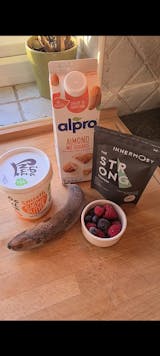One very common discussion in the fitness world is the influence of metabolism. Metabolism and weight loss, to be exact. One person's metabolism can vary vastly from another, and this is largely down to the way our body consumes and uses energy - which may come as a surprise to some people.
So if that's the case, let’s talk about energy.
Doing things uses up energy. Going for a run uses energy, binge watching a Netflix series uses energy (let’s call it a workout?) – even sleeping uses energy. Bottom line: everything we do uses up energy. That means we need a lot of fuel, and we gain this through our food and drink consumption.
Our bodies essentially use up energy in two ways: through physical activity and through, basically, staying alive. Our metabolism also has a big part to play in that. But first, lets get that all-important metabolism definition out of the way, shall we?
What is metabolism?
For a simple metabolism definition: your ‘metabolism’ is the set of processes that occur inside your body to keep you alive. Think digesting food, temperature regulation, respiration, and so on. Metabolism is a complex process which takes the calories we have consumed, along with the oxygen we breathe, to combine and release energy. The rate that we do this, however, as we've said, can vary from person to person. This is called our individual Basal Metabolic Rate.
What is a basal metabolic rate?
The amount of energy needed by your body to carry out these processes is known as your ‘Basal Metabolic Rate’ (BMR). To put it simply, BMR is a unit of measurement. We measure energy in units known as ‘calories’ (ever heard of ‘em?), so, your BMR translates to the amount of calories you’d burn in a day if you lay very still and did nothing all day.
This means that when people pursue a 'fast metabolism', what they really mean is that they want a high BMR - i.e. to be burning more calories at rest. Sounds good if your fitness goal is to lose weight, right?
What's the correlation between metabolism and weight loss?
Ready for a crazy fact? Your metabolism accounts for up to 70% of your body’s daily energy use, depending on your body size and composition: muscle cells need more energy to maintain than fat cells do (about three times the amount).
This means that people with more muscle mass tend to have a higher BMR, requiring more calories to keep their body functioning properly. Makes sense. A lower BMR, means your body needs less energy to function, and so uses up less energy from fuel (food).
As such, you may find you need to exercise more in order to burn the ‘left over’ calories that you eat, in order to maintain a healthy weight. For example, say you are eating 2,000 calories a day, and your BMR is 1,600. This means you’d need to burn 400 calories in a day from physical activity. The more calories you burn, the fewer will be stored in the form of fat in the body, meaning boosting your metabolic rate can encourage healthy weight-loss.
How can I increase my metabolism?
So can you increase your metabolism? Sort of! What you’re really doing is increasing your BMR... the rate at which you burn calories, just to be clear. There are a few ways to increase your metabolism and up your BMR. To burn more calories at rest, try out the following:
1. Eat metabolism boosting foods:
- Protein
- Get spicy.
- Foods rich in Iron, Zinc, Iodine and Selenium
- Green tea
Green tea is growing in popularity with every day that passes, and it's not hard to see why. This miracle drink is known to increase your metabolic rate due to its concentrated source of antioxidants known as 'catechins', which increase energy expenditure.
Does metabolism increase with exercise?
If you're looking to improve your BMR through exercise, cardio is the way forward.
- Aerobic exercise
- Strength training
- Ice-ice baby
Your body uses energy getting your ice cold water to body temperature, so load up on the cubes. Have you seen our article on the benefits of turning down the temperature? Check it out for more information on this underrated technique.
Finally... let's cut to the chase: try out our Tone Capsules, which combine a host of functional ingredients designed to boost metabolism and aid healthy weight-loss. Metabolism and weight loss can be considered a taboo subject, but lets be real - weight loss is not a dirty word, and neither is metabolism. It's time we all stopped acting like they are!
References
- Science Direct (2013). Energy Expenditure Overview. Progress in Molecular Biology and Translational Science. Click here.
























